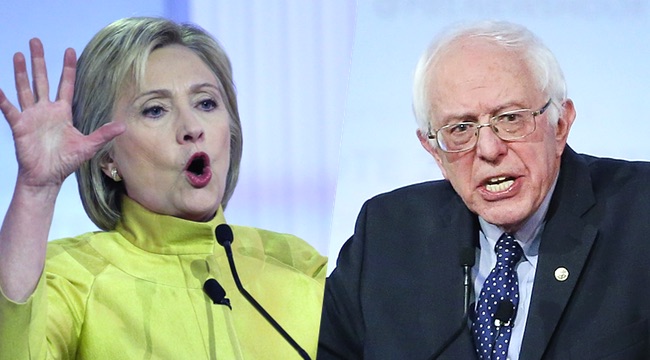
On Thursday evening, Bernie Sanders and Hillary Clinton squared off for the PBS Democratic Debate in Milwaukee. This debate follows Sanders taking 60 percent and claiming victory in the New Hampshire primary, which was a far cry from the “virtual tie” and coin tosses of the Iowa Caucus. From here, they’ll head to the Nevada caucus on Feb. 20 while the Republicans (who will debate this Saturday on CBS) focus on their South Carolina primary.
At this debate, the two Democratic candidates didn’t enter into a shouting match (like they did ahead of New Hampshire), but Sanders did grow exasperated a few times. At one point, he accused Clinton of “a low blow” while they discussed jobs, and he shut down Clinton’s claims that she would be better for the economy: “Secretary Clinton, you’re not in the White House yet.” The two dug into a variety of issues, including universal health care, immigration, Wall Street, minimum wage, Super PACs, and legalization of marijuana (Bern is all for pot). Much of this information was a rehash of prior debates and interviews, but Clinton and Sanders went harder than they previously have on the subject of racial inequality.
That subject came up with a question about the high incarceration rate among black males. Sanders called this one of the “greatest tragedies” of America, for any given member of this demographic “stands a one-in-four chance” of landing in jail. Sanders described this reality as “unspeakable” and evidence that the criminal-justice system is broken and in need of “radical reform.” Sanders pointed toward equal offender rates, but sentences that are anything but equal. He moved on to police corruption and how “unarmed people, often African-Americans” are killed by police officers. Clinton “completely agreed” with Sanders on all of these points. Likewise, he agreed with her on the “very bad idea” of mandatory sentences. Both agree that systemic racism (which not only carries criminal, but heavy financial implications) is an ongoing issue in need of progress.
Now for an interlude before getting to the meat of this discussion.
Who does the finger wag better? RT for Bernie, Fav for Mutumbo #DemDebate pic.twitter.com/chSw5s9WxP
— D-Petitt (@petitt_dylan) February 12, 2016
Where Sanders and Clinton do not agree — in the slightest — would be the subject of foreign policy. The two sparred over ISIS and the aftereffects of the Iraq War along with ball-dropping that follows regime changes. Clinton’s take on taking out ISIS had everything to do with working alongside American Muslims to fight terrorism. However, Sanders called shenanigans on Clinton by pointing how she facilitated the “political vacuum” that helped ISIS flourish. How so? Sanders ripped into Clinton for helping “overthrow dictators all over the world,” including Libyan dictator Muammar Gaddafi, during her tenure as secretary of state:
“A powerful nation like the U.S., we can overthrow dictators all around the world. But the point about foreign policy is not just to know you can overthrow a dictator, it’s understanding what happens the day after … I believe as president I will look very carefully about unintended consequences. I will do everything I can to make certain that the United States and our brave men and women in the military do not get bogged down in perpetual warfare in the Middle East.”
Sanders further hammered Clinton’s regular support of U.S. intervention while citing his opposition to the 2002 Iraq invasion, but Clinton was ready for Sanders. She cited his support to end Saddam Hussein’s regime in Iraq, which “I think is fair to call a regime change resolution.” Sanders had one more weapon in his arsenal that Clinton couldn’t defend herself against.
Sanders pulled out Clinton’s recent admission that she followed Henry Kissinger’s advice. Clinton brought this up at the New Hampshire debate, where she admitted being “very flattered when Henry Kissinger said I ran the State Department better — better than anybody had run it in a long time.” Kissinger, of course, was secretary of state under Richard Nixon. Sanders says Kissinger is “not my kind of guy” because he contributed to his own “vacuum” of instability in 1970s Cambodia. The fallout included mass genocide, so Sanders finds it “rather amazing” that Clinton would take advice from someone with such aggressive foreign policy. Sanders labelled Kissinger as one of the most “destructive” secretaries of state. Sanders wasn’t finished:
“I am proud to say that Henry Kissinger is not my friend. I will not take advice from Henry Kissinger. And in fact, Kissinger’s actions in Cambodia, when the United States bombed that country, overthrew Prince Sihanouk, created the instability for Pol Pot and the Khmer Rouge to come in, who then butchered some 3 million innocent people, one of the worst genocides in the history of the world. Count me in as somebody who will not be listening to Henry Kissinger.”
Sanders further concluded — after much back and forth — that Clinton cannot be trusted, for she once criticized then-Sen. Barack Obama’s foreign policy while running against him for president. Then she hopped onboard with Obama’s program as secretary of state. The segment closed with both Sanders and Clinton agreeing that Franklin Delano Roosevelt was both inspirational (“the only thing we have to fear is fear itself”) and also someone who redefined what government can do. Clinton agreed with Sanders, but she couldn’t recover from the brutal Kissinger takedown. Watch it here.
